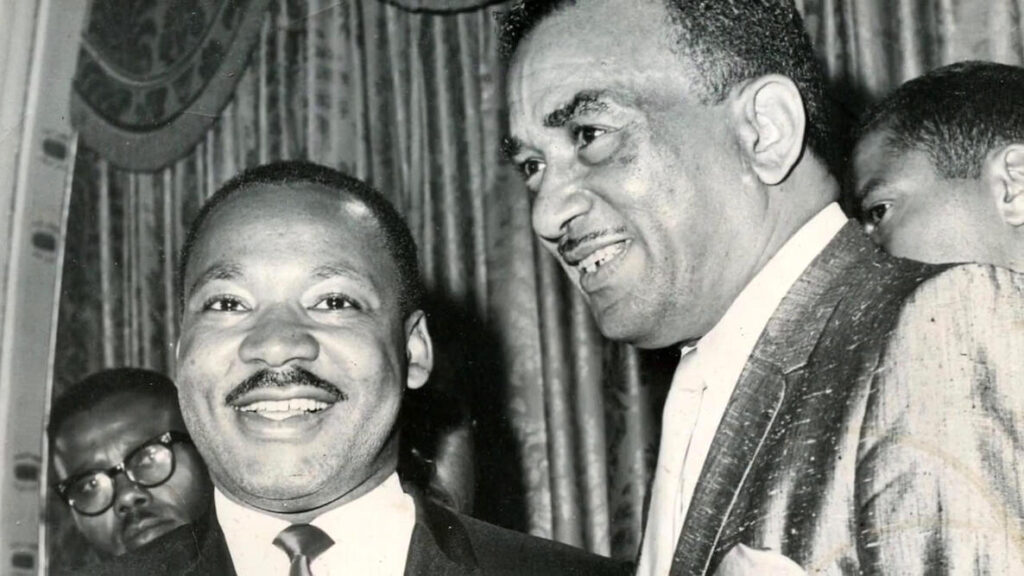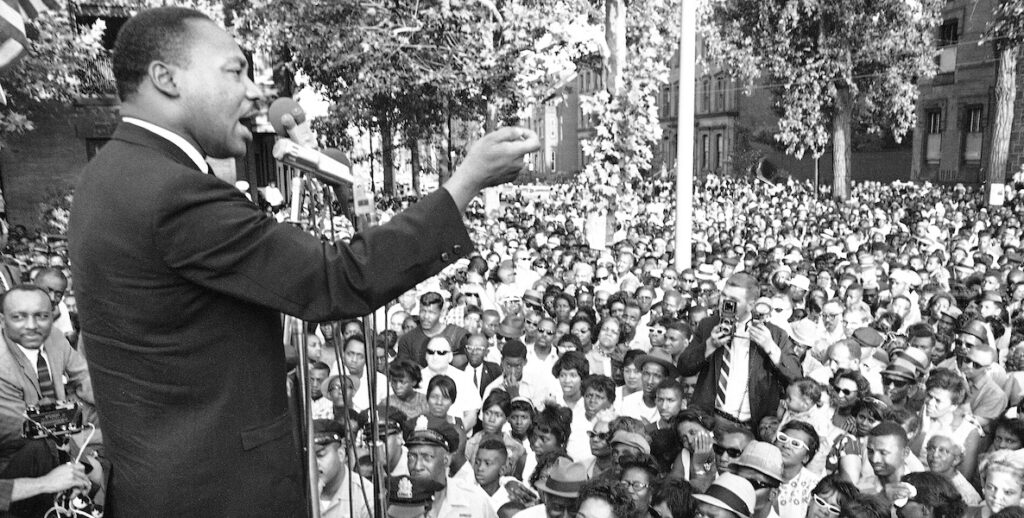Anyone who knows anything about Martin Luther King Jr.— whose birthday we celebrate on January 17 — knows that at the heart of his social activism was the idea of nonviolence, which he described as a “powerful and just weapon, which cuts without wounding and ennobles the man who wields it. It is a sword that heals.”
But how many know that Dr. King first encountered the ahimsa ideals of Mahatma Gandhi here in the City of Brotherly Love?
As he wrote in his autobiography, Stride Toward Freedom, King in 1949 was a young student at Crozer Theological Seminary in Chester — that’s right, he went to seminary school here, too! — and had all but given up on the idea of love as a means to solve social problems.
Then he attended a sermon by Dr. Mordecai Johnson, then Howard University’s president, at First Unitarian Church, sponsored by the Fellowship House. Johnson had visited India, and met Gandhi, and as he spoke about the man’s principles, King was moved. He bought Gandhi’s books — and a nonviolent Civil Rights Movement was born in America.
That was only the start of King’s connection to Philadelphia. “Philadelphia has always been one of the most significant cities for African Americans, starting with having the highest number of free Blacks,” says Diane D. Turner, director of the Charles L. Blockson Afro-American Collection at Temple University Libraries. “Pennsylvania also has the two oldest historically Black colleges — Cheyney and Lincoln universities. Martin Luther King would have had connections to those as well.”
While in seminary school, King met and eventually became close to Rev. William H. Gray, III, who would go on to become the highest-ranking African American in Congress during the 12 years he represented Philadelphia in the House of Representatives. The two men preached side by side at Gray’s Bright Hope Baptist Church several times over the years.

And in 1965, as Tigre Hill chronicled in Broad + Liberty in 2020, King brought his movement to Philadelphia, to support another legendary Philadelphia Civil Rights leader, Cecil B. Moore, protesting the segregation of Girard College. At first, as Hill writes, Moore was not pleased by King’s involvement: “Moore heard about King’s impending visit from a local reporter and he was visibly upset. He saw it as an attempt for King to grab headlines and take credit for all of the work Moore had done.”
Other local ministers and activists convinced Moore to meet with King, and the two formed a connection shortly before King took the stage to praise his Philly counterpart.
“It is a sad experience at this stage of the 20th century to have to stand in the city that has been known as the cradle of liberty, that has in its midst and in its presence a kind of Berlin Wall to keep the colored children of God out,” King said. “This school is symbolic of a tragic evil in our nation. We should all thank this man, Cecil B. Moore, who as a soldier of justice and a warrior of equality is leading the effort to remove this cancer from our country.”
Several years ago, Turner worked with Philly school teachers on a project to retool conversations about Civil Rights. In particular, she dove into our city’s relationship to Martin Luther King, which spanned the last 20 years of his life. As she notes on a timeline at ushistory.org, “The Philadelphia region was an important place in MLK’s formative years from the age of 19 and also where he built important alliances and conducted civil rights activities.”
Here, some of the highlights of Dr. King’s connection to Philly
(Turner’s timeline has been edited and updated)
- 1948: Martin Luther King entered Crozer Theological Seminary in Chester, and also started auditing classes at Penn.
- 1949: King attended Johnson’s sermon, and bought Gandhi’s books. In a WHYY story in 2020, Philly journalist Linn Washington—who has spent years researching King’s connection to our city — quoted Fellowship House’s late longtime leader Marjorie Penney talking about this event: “If we had done nothing more in our lives than to have brought Johnson and King together, it was worth everything.”
- 1949: The same year, King met William H. Gray, III. The Gray and King families developed a lasting relationship.
- April 2, 1957: King was the recipient of the National Fellowship Award of the Philadelphia Fellowship Commission at the Benjamin Franklin Hotel.
- December 1958: King delivered a sermon at Rev. Gray’s legendary Bright Hope Baptist Church, 12th and Oxford streets, where he told the audience, “Segregation is dead, but the time of the funeral hasn’t been fixed!” Among those who shared the pulpit with Dr. King that day were AME Bishop R.R. Wright, Jr. and E. Washington Rhodes, publisher of The Philadelphia Tribune.
- February 1, 1959: King was guest of honor at the 18th observance of National Freedom Day at the Liberty Bell.
- August 1959: King was in Philadelphia with Rev. Ralph Abernathy for a fundraising drive to help Southern leaders in their all-out effort to get Negroes registered and voting. A photograph from the time includes Father Thomas S. Logan, Calvary P. E. Church, 41st and Brown; Rev. Austin Jefferson, president of the Baptist Ministers’ Conference of Philadelphia and Vicinity; and Gray, of Bright Hope Baptist Church.
- November 1959: An inter-faith, interracial mass meeting of the Philadelphia Crusade for Citizenship Rally at the Baptist Temple Church, Broad and Berks was held to secure funds for King’s Southern Christian Leadership Conference.
- June 6, 1961: King was the guest speaker at Lincoln University, which gave him an honorary degree.
- December 1, 1961: King was admitted to Mercy-Douglass Hospital for a physical checkup. Dr. Harold Pierce, renown pioneering African American physician, was his doctor.
- April 30, 1962: King, Jackie Robinson, Mahalia Jackson, James L. Farmer and Bishop George Baber received citations from the Baptist Minister’ Conference of Philadelphia and Vicinity, first President’s Award Night at Penn’s Irvine Auditorium.
- July 1963: Congressman Robert N.C. Nix, Pennsylvania’s first Black congressman, sent a telegram to King pledging his support for the March on Washington.
- 1963: King gave his famous “I Have a Dream” speech at the March on Washington, where the largest contingent of attendees came from Philadelphia. African American power broker Samuel Evans organized 500 buses and reserved a train (42,000 people).
- October 27, 1963: King spoke at the Bright Hope Baptist Church’s ground breaking ceremonies for their new $650,000 church and youth center.
- August 10, 1964: King spoke at the 41st meeting of the Alpha Kappa Alpha Sorority in Penn’s Irvine Auditorium to 3,000 African American women urging increased Negro voter registrations and asserting that violence and war were obsolete.
- October 7, 1964: King, selected as “Man of the Year,” by Time Magazine, spoke at the “Sound of Freedom” program sponsored by Greater Philadelphia Citizen Committee.
- May 1965: King spoke at the Golden Slipper Square Club and received a donation of $1,000, plus $7,000 which had been given to King earlier by 60 Jewish communal leaders at the Locust Club luncheon, used to fight for Negro voting registration in Alabama and Mississippi.
- August 1965: As part of a major protest campaign in six northern cities, including Philly, Chicago, Cleveland, New York, Newark, and Washington, D.C., King visited Philadelphia for two days for a “Freedom Now” rally. Over 10,000 people heard King speak at 40th and Lancaster in West Philly. (Today a Mural Arts mural and a PA Historical Marker mark the site). Later King spoke alongside Cecil B. Moore to thousands at the Girard College wall, and the Baptist Temple at Temple University.
- October 26, 1967: The Southern Christian Leadership “Freedom Tour” came to Philadelphia. The main event was a celebrity-studded fundraiser at the Spectrum featuring Harry Belafonte and Sidney Poitier, Aretha Franklin and Nipsey Russell. At all of the venues, King delivered a version of his “Other America” speech.
- February 1968: King developed laryngitis while in Philadelphia organizing an anti-Vietnam campaign. He was treated by Walter P. Lomax Jr, noted African American physician, businessman and philanthropist. This would be King’s last visit before his assassination on April 4, 1968 in Memphis, Tennessee.
RELATED

